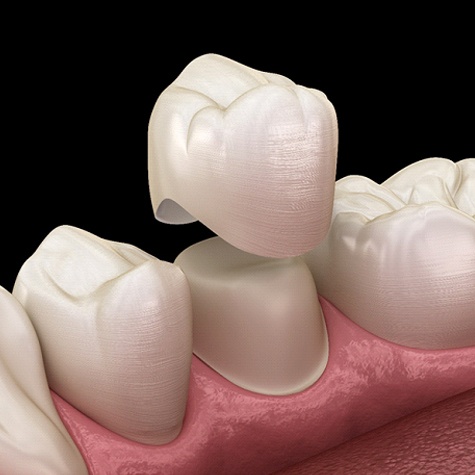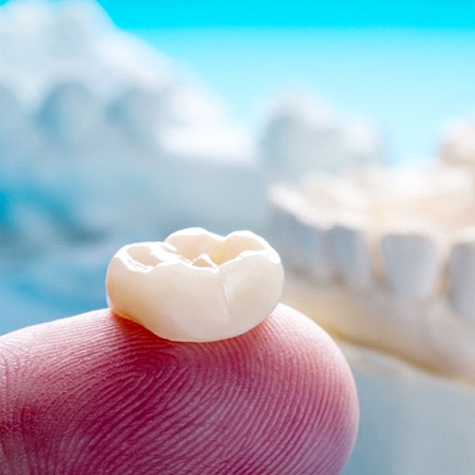SMILES 4U
Doylestown, PA 18901 (215) 345-6500 REQUEST AN APPOINTMENT
Even if you take excellent care of your teeth, a sudden accident could leave them cracked or fractured. Without prompt repairs, the tooth could become infected, suffer further damage, and at some point might even have to be removed altogether. In order to keep your natural smile as intact as possible, Dr. Kandov can restore your injured teeth with dental crowns made out of carefully chosen, natural-looking materials. Contact Brite Smiles today to schedule a consultation so that we can begin the process of fixing your smile!

A dental crown is usually placed on teeth that have suffered from severe decay or trauma; their purpose is to restore the shape and size of the tooth while protecting the already damaged parts of the structure. You might receive a crown if:


Teeth that are covered by crowns do not require any special kind of care, but it’s important to realize that they’re still vulnerable to decay and gum disease. That means brushing and flossing are just as important as ever. Be sure that you’re paying close attention to the area where the gum meets the tooth. Rinsing with an antibacterial mouthwash will help in cleaning the spaces that you have trouble reaching on their own.


If you have a tooth that is decayed, broken, or otherwise structurally compromised, a dental crown may be what you need to keep your tooth safe. However, you may have some concerns regarding the cost of your treatment. We won’t be able to tell you exactly how much you can expect to pay until you see us in person. Until then, here are some things for you to take into consideration.

Here are the main factors that are considered when determining the cost of your dental crowns:
Keep in mind that cheaper isn’t always better when it comes to dental restorations. Your dental crown is going in your mouth for many years, so it’s important that it is quality. When you invest in a good dental crown, it can last for many years down the road.

Dental crowns are considered to be a major dental procedure, so your insurance provider will likely cover approximately half of the cost. We are proud to be an in-network provider with most PPO dental insurance plans. If you have any questions regarding dental insurance, don’t hesitate to talk to one of our friendly team members.

If you don’t have dental insurance, this does not mean that you’re completely out of luck! With our Dental Passport Program, you can save 15% on procedures completed at our practice. We also work with CareCredit – a third-party financing company that can split the cost of your treatment into manageable monthly installments with little to no interest. To learn more about your financial options, give us a call!
To find out exactly how much you can expect your dental crown to cost, schedule an appointment with us. We’re eager to help restore your smile to health!

Receiving dental crowns can be a bit unnerving. Even if you know it’s a necessary procedure, having artificial materials inside your mouth may cause you to ask many questions about the process and expectations. Dr. Kandov wants all her patients to feel confident in their decision to move forward with any procedure, so to help you feel more assured of your choice to receive customized dental crowns, she’s provided answers to the questions listed below.
Although you cannot reverse the process or revert to your former smile, dental crowns are not “permanent.” Instead, they are designed to protect and cover a vulnerable tooth, but they must be replaced after years of wear. The average dental crown can last between 5-15 years depending on how well you take care of it.
Because your dentist must file down and alter your natural tooth to ensure a proper fit, a dental crown must be worn for the remainder of your life to make sure the structure stays in place and remains free of decay or damage.
Dental crowns on their own cannot decay; however, the tooth underneath the crown certain can. If the seal is broken or poor oral hygiene occurs, there’s a good chance that bad oral bacteria will form and spread beneath the restoration, affecting the natural tooth and causing additional harm. You’ll need to be diligent in maintaining optimal oral hygiene habits at home such as brushing, flossing, and rinsing. You’ll also need to make sure you’re seeing Dr. Kandov every six months for regular checkups and cleanings.
Your dentist proudly uses porcelain crowns, which are known to be safe for patients undergoing an MRI. But if you have other restorations that are made of metal or porcelain-fused-to-metal, it can be extremely dangerous.
It’s always best to inform the lab technician of any restorations you have inside your mouth. They will be able to identify if any might cause a problem or not. With many of the machines used today, metal is becoming less and less of an issue; however, it’s always better to be safe than sorry, especially since this material can become loose and distort images, causing difficulty for your physician when attempting to diagnose a problem.
No, you can whiten dental crowns. They are not porous like regular tooth enamel, so stains and discoloration can only be treated by replacing your crown with a new one. This can become costly, so it’s important that you do everything possible to avoid stain-causing beverages and foods as well as take optimal care of your teeth and gums in between dental appointments.